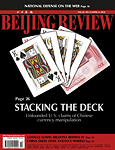|
January 2009
U.S. Treasury Secretary Tim Geithner said the Obama administration believes China is "manipulating" its currency in written responses to questions from Senate Finance Committee members.
Geithner also stressed Obama's promise to "use aggressively all diplomatic avenues open to him to seek change in China's currency practices."
April 2009
The Obama administration said in its regular report to Congress that it believes China's currency is still undervalued, but that the country has taken steps to rebalance its economy, including allowing the yuan to rise.
The administration justified the apparent switch in rhetoric by noting that China's currency has continued to rise against the dollar, while currencies of other emerging countries have fallen amid the global recession.
Senator Charles Schumer said the administration made the right call.
"The fact that China's currency has not depreciated but even appreciated a little while all other currencies depreciated against the dollar does show some progress," he said.
Schumer said he still believes China is manipulating its currency, but that "this wouldn't have been the opportune time" to designate the country a manipulator.
Senator Lindsey Graham said he was grateful for the recent appreciation in the value of the yuan, but said more must be done to address the existing currency imbalance. There was "just no doubt" China is manipulating its currency, he said.
November 2009
Obama's visit to China put the spotlight on one of the top hot-button issues in Sino-U.S. relations: revaluing the Chinese currency.
The U.S. Treasury officials called on China to let the value of the yuan rise against the U.S. dollar, hoping Obama would keep pressuring China.
But Obama only cited China's "past statements" in support of shifting toward market-oriented exchange rates, implying that he had not extracted a fresh commitment from Beijing to moving in that direction soon.
February 2010
A group of 15 U.S. senators insisted China's currency practices are a subsidy. "There can be no doubt that China's policy of large-scale intervention in the exchange markets and the significant undervaluation of its currency act as a subsidy to Chinese exports," the senators said in a letter to Commerce Secretary Gary Locke.
They wanted the department to include an estimate of how much China undervalues its currency when it calculates "countervailing duties" on Chinese goods in individual cases filed by U.S. producers.
"Because the yuan is artificially devalued by 15-40 percent below its true market value, American companies are losing market share for no reason," Senator Lindsey Graham said.
"An investigation of Chinese currency manipulation as a countervailing trade subsidy makes sense," Senator Robert Byrd said.
March 2010
A group of 130 U.S. lawmakers issued an open letter, urging action against China's currency policy.
"The impact of China's currency manipulation on the U.S. economy cannot be overstated. Maintaining its currency at a devalued exchange rate provides a subsidy to Chinese companies and unfairly disadvantages foreign competitors," the lawmakers said in a letter to U.S. Treasury Secretary Timothy Geithner and Commerce Secretary Gary Locke.
They urged the Department of Commerce to "apply the U.S. countervailing duty law in defense of American companies who have suffered as a result of the currency manipulation," and also asked the Department of Treasury to "include China in its bi-annual agency report on currency manipulation."
| 